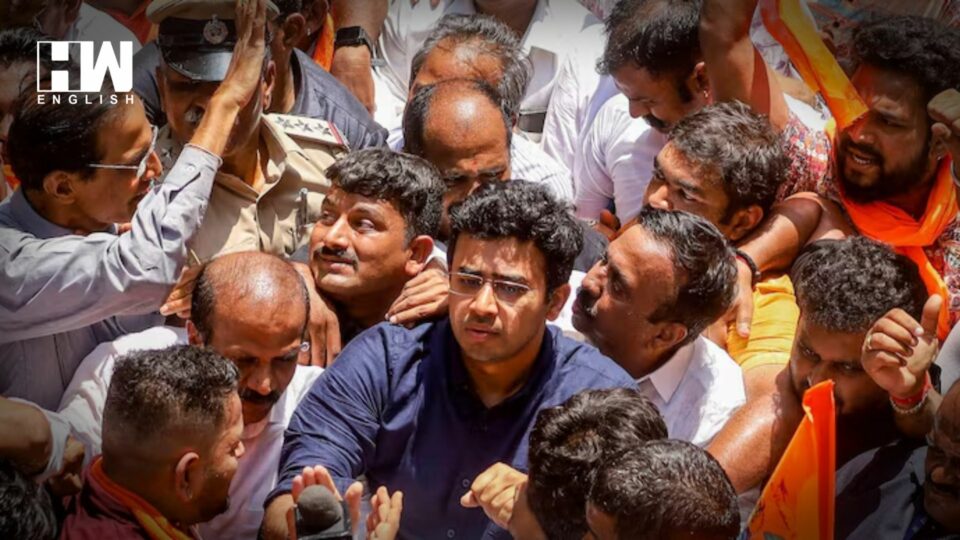Bharatiya Janata Party (BJP) MP Tejasvi Surya found himself embroiled in controversy after a meeting with voters took an unexpected turn. During what was intended as a meet-and-greet session, Surya abruptly departed the venue, sparking outrage among attendees.
Following this incident, aggrieved Shri Guru Raghavendra Cooperative Bank customers lodged a formal complaint with the Election Commission of India (ECI). The complaint targets several BJP leaders, including Tejasvi Surya, along with election officials.
The backdrop to this development lies in a cooperative meeting held in Basavanagudi, where Surya faced questioning from victims of the Shri Guru Raghavendra Cooperative Bank financial scandal.
A video circulating on social media captures the moment when incumbent Bangalore South MP Surya, accompanied by his uncle MLA LA Ravi Subramanya, faced heckling from the crowd.
The financial scandal in question dates back four years, with approximately 8,000 customers still awaiting compensation from the bank, each having deposits exceeding ₹5 lakh.
In response to the scandal, the Enforcement Directorate (ED) launched an investigation and seized assets worth ₹159 crore belonging to the bank. Subsequently, the Karnataka government transferred the case to the Central Bureau of Investigation (CBI).
As per reports, Surya, in his performance report, claimed credit for amendments to the Deposit Insurance and Credit Guarantee Corporation (DICGC) Act, purportedly benefiting 98% of bank depositors nationwide. However, the aggrieved customers contest this claim, labelling it as false.
What was the complaint about?
Aggrieved customers of the Shri Guru Raghavendra Cooperative Bank have taken a significant step in response to the recent altercation involving BJP MP Tejasvi Surya. On Monday, accompanied by Congress MLA UB Venkatesh, they lodged a formal complaint with the Election Commission of India (ECI).
Three customers filed a two-page complaint against three BJP leaders: Tejasvi Surya, his uncle Ravi Subramanya, and local party official Girish, alongside poll officials from Bangalore South constituency. They demand stringent action in light of the incident that occurred during a meeting organized by BJP leaders on April 13 in the Basavanagudi Assembly constituency.
During the meeting, attendees raised concerns about the grievances of bank depositors remaining unaddressed. When Surya and Subramanya were questioned about this, Girish attacked the depositors and seized a camera to prevent election staff from recording the events.
The complaint asserts that these actions took place in the presence of election observers, with assistant election officers allegedly covering up the incident and aiding the accused instead of documenting it. The complainant expresses doubts about the impartiality of officials who supported the BJP leaders’ actions and calls for their removal from election duties.
What was the whole cooperative bank scam about?
The magnitude of this multi-crore scam, estimated to be around ₹2,500 crore, which came to light when the Reserve Bank of India (RBI) imposed withdrawal restrictions on the cooperative lender back in 2020.
According to reports of aggrieved customers, out of the 30,000 depositors affected, approximately 20,000, whose deposits were below ₹5 lakh each, received some respite through the Deposit Insurance and Credit Guarantee Corporation (DICGC) insurance scheme. However, even those who had deposited more than ₹5 lakh were only compensated up to ₹5 lakh, leaving their principal deposits in limbo.
As per a report by South First, Harish V, a distressed customer present at Saturday’s meeting, shed light on the DICGC insurance scheme, which traditionally covered only up to ₹1 lakh per depositor. However, amendments now mandate the disbursement of ₹5 lakh within 90 days of a bank’s closure, providing relief to affected depositors.
ALSO READ: Patanjali Case: Supreme Court Raps Baba Ramdev Again
Yet, despite these measures, approximately 10,000 individuals, constituting 80% of the total deposited amount of ₹2,500 crore, remain trapped in the ordeal. After addressing the deposits covered under the DICGC scheme, a substantial sum of ₹1,700 crore remains entangled within the bank. Complainants also emphasized that around 7,000 to 8,000 aggrieved customers are still awaiting the resolution of their deposits from the bank.
Speaking to South First, Harish illuminated the sequence of events leading up to the encounter. The Sahakara Samagama meeting, aimed at addressing cooperative bank affairs, provided a platform for depositors to confront Surya and Ravi Subramanya regarding unfulfilled promises made ahead of the 2023 Assembly polls. Despite assurances to resolve concerns and secure fresh investments, depositors found themselves disillusioned as the promised solutions failed to materialize post-election.
South First reports also suggest that retired RBI officer KN Ranganath, who serves as the president of Sri Guru Raghavendra Cooperative Bank, revealed the personal toll of the scandal gripping the institution. Having invested ₹40 lakhs of his hard-earned money, Ranganath has waited over four and a half years for compensation, receiving only ₹5 lakhs under the DICGC insurance scheme. Ranganath highlighted the dire consequences of the prolonged ordeal, noting that around 200 aggrieved customers have already passed away, with more lives at risk in the future.
Despite mounting pressure and calls for accountability, Tejasvi Surya remained steadfast in deflecting blame, attributing the disruption to alleged interference by the Congress party. In a social media post, he accused the opposition of resorting to underhanded tactics in an attempt to undermine the BJP’s campaign efforts.
As an independent media platform, we do not take advertisements from governments and corporate houses. It is you, our readers, who have supported us on our journey to do honest and unbiased journalism. Please contribute, so that we can continue to do the same in future.

